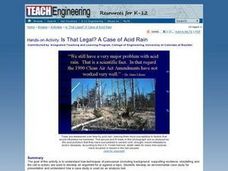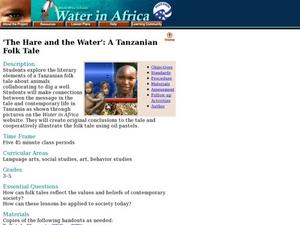Curated OER
Mean, Median, Mode, and Range - Homework 14.3
In this data and statistics instructional activity, students find the mean, median, mode, and range of 4 different sets of data. Next, students solve 1 word problem where they find the mean.
Curated OER
Credit Cards: The Good, the Bad, and the ugly
Students study how dangerous credit cards can be. They see why it is important to pay off credit card bills as soon as they can. They use MS Excel to display and understand the data. They fill out questions using the data from their...
Curated OER
Flannery O'Connor's "A Good Man is Hard to Find": Who's the Real Misfit?
Students discuss the characteristics of the literary genre known as "Southern Gothic". They write an analysis of the short story, "A Good Man is Hard to Find" by Flannery O'Connor.
Curated OER
How Characters Get What They Want
Sixth graders analyze the primary force that drives a character's actions in a character analysis lesson plan. In this character analysis lesson plan, 6th graders analyze how characters present their actions and participate in a group...
Curated OER
1984
In this novel analysis worksheet, students use the various sections with online links to complete activities about the novel 1984. Students explore domestic surveillance, the U.S. Patriot Act, online privacy, advertising, doublespeak,...
Curated OER
Jem in "To Kill a Mockingbird": Fun Trivia Quiz
An in-depth quiz on Jem from Harper Lee's classic novel To Kill a Mockingbird, this quiz combines basic recall skills with some plot and character analysis. Unlike many Fun Trivia quizzes, the content of this quiz deals with plot events...
Curated OER
Sex Stereotypes in Society
Students analyze a collection of advertisements or photographs in a text or magazine and identify the stereotypes used or possible biases of the editors. They discuss how these stereotypes are formed, and the ways in which they impact...
Curated OER
Understanding the Bush Tax Cut Plan
The class examines the new tax cut plan proposed by President Bush. They practice calculating income tax rates and interpreting the data. Then they research topics that are of interest to them related to taxes.
Student Achievement Partners
Jacob and Wilhelm Grimm - "The Fisherman and his Wife"
Help young readers learn to read and interpret complex text independently. Teach young children to ask interpretive questions and use the text itself to answer them. Use art, word play and drama to provide a deeper understanding of...
Curated OER
Is That Legal? A Case of Acid Rain
Develop an environmental case study! Elementary learners discover how a case study is used as an analysis tool. The goal of this activity is to show pupils how techniques of persuasion (including background, supporting evidence,...
Curated OER
The Hare and the Water: A Tanzanian Folk Tale
"The Hare and the Water," a Tanzanian folk tale, lends a global perspective to literary analysis. Learners spend the first two days reading and storyboarding. On day three, they examine folk tale elements (worksheet included), and design...
Curated OER
Slavery: Acts of Resistance
Historical accounts of various events have proven to differ depending on the point of view of the person documenting the event. Learners read and analyze two first person accounts of acts of slave resistance seen at a southern...
New York State Education Department
English Language Arts Examination: June 2018
Is graffiti art? Writers explore that question as part of a source-based argument within a set of questions from the NY Regents examination. The assessment from June 2018, part of a larger set of standardized tests, consists of three...
New York State Education Department
English Language Arts Examination: August 2015
Assessing a variety of skills using numerous item types is a great way to collect data for formative and summative use. Using a challenging exam, scholars prove their comprehension and reading skills through multiple choice, task, and...
Bantam Books
The Tempest: Think-Aloud Annotation
It can be difficult to refer back to a text when analyzing it, so annotation is a great tool for kids to track what they are reading. A thorough and well-organized activity guides learners through the process of annotating William...
Bowland
How Risky is Life?
"Life is more risk management, rather than exclusion of risks." -Walter Wriston. Scholars use provided mortality data to determine how likely it is a person will die from a particular cause. They compare the data to the perception of the...
Curated OER
Crude Conversation
Learners analyze text and maps in determining the effect the world's energy resources have on human society, and make charts illustrating at least three ways each resource makes life easier for human society.
What So Proudly We Hail
Life, Liberty, and the Pursuit of Happiness: A Lesson on the Declaration of Independence
What does it mean to say that a right is unalienable? How did the founding fathers convey this revolutionary concept in the Declaration of Independence? Engage in a close reading and analysis of the Declaration of Independence, and...
Curated OER
Daughters Come of Age in Women's Fiction
Introduce your young readers to fiction written by women authors. For each story, they explore the way these daughters discover and claim their own identities. Individually, class members use the literature to examine their role in their...
Gilder Lehrman Institute of American History
Slave Narratives: Frederick Douglass, Harriet Jacobs, and the Columbian Orator
Young historians practice in-depth, quality analysis of primary source texts in this three-lesson unit, which examines excerpts from the slave narratives of Frederick Douglass, Harriet Jacobs, and Caleb Bingham.
Pottsgrove School District
Tall Tales
Young readers compare and contrast digital and print versions of tall tale text. The resource includes a character analysis in which pupils compare and contrast traits, and make inferences about what the characters do and say. They...
EngageNY
Grade 9 ELA Module 2, Unit 2, Lesson 2
Continue a thoughtful analysis of Sophocles' Oedipus the King by discussing the importance of dialogue within the play's structure. Ninth graders examine how Oedipus speaks about himself to his subjects and Creon before recording their...
EngageNY
Grade 9 ELA Module 2, Unit 2, Lesson 13
The text structure is vitally important when crafting a rise in tension. Explore Sophocles' choice to order his events in a particular sequence with a lesson about Oedipus the King. As the light of realization dawns on the characters,...
Consortium for Ocean Leadership
Nannofossils Reveal Seafloor Spreading Truth
Spread the word about seafloor spreading! Junior geologists prove Albert Wegener right in an activity that combines data analysis and deep ocean exploration. Learners analyze and graph fossil sample data taken from sites along the...

























